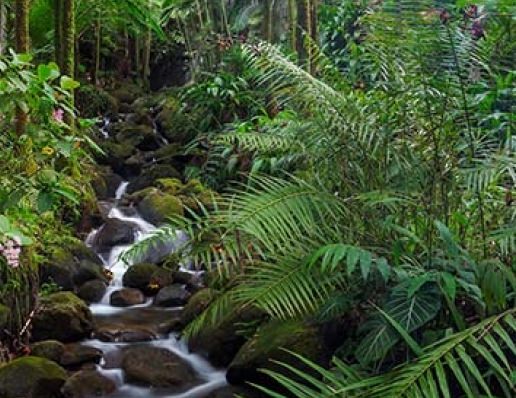The Amazon is perishing much faster than expected, increasing the urgency for dramatic action to save the rainforest and protect the world against the worst ravages of climate change, a study finds.
Tropical climate scientists are seeing their worst nightmares coming true as vast swathes of forest are cut down to make way for cattle and soy, while the trees that have been left are hit by rising temperatures and drought.
As a result, the tropical rainforests the world relies on to curb global warming are absorbing far less of humanity’s planet-warming CO2 emissions than they were just 20 years ago, according to a study in the journal Nature.
“After years of work deep in the Congo and Amazon rainforests we’ve found that some of the most worrying impacts of climate change have already begun. This is decades ahead of even the most pessimistic forecasts,” said lead author Prof Simon Lewis, of Leeds University.
“There is no time to lose in terms of tackling climate change,” he said.
Prof Lewis is calling for urgent action to tackle deforestation, logging and forest fires as well as an acceleration of measures to limit climate change.
Professor Bonaventure Sonké from the University of Yaounde in Cameroon said: “The speed and magnitude of change in these forests suggests that climate impacts in the tropics may become more severe than predicted.”
Greenhouse gas emissions
The world’s tropical rainforests are absorbing 45 per cent less CO2 than two decades ago, falling from 4.6 billion tonnes a year in the 1990s to 2.5 billion tonnes in the 2010s.
The 2.1bn tonne-a-year decline is more than five times the UK’s annual total greenhouse gas emissions.
The decline in the Amazon is particularly concerning, with the forest on course to go from being a major absorber of CO2 – or carbon sink – to a net emitter of it, or carbon source.
That’s because climate change is stunting the trees growth, meaning they absorb less CO2.
At the same time, the worsening conditions are killing off large numbers of trees, which give off huge amounts of carbon as they decompose, scientists say.
Without urgent action the Amazon will stop being a carbon sink in 2035 and by 2040 it will be giving off more CO2 than it absorbs, Prof Lewis says.
“One big concern for the future of humanity is when nature switches from slowing climate change to accelerating it,” he said.
The study by almost 100 institutions provides the first large-scale evidence that carbon uptake by the world’s tropical forests has already started a worrying downward trend.
Campaigners’ reaction
Friends of the Earth’s head of policy Mike Childs said: “The failure to heed the warnings of climate scientists over the last 30 years means we are now on the brink of dangerous tipping points that could accelerate the climate crisis – and potentially make it unstoppable,” said Mike Childs, of Friends of the Earth.
James Gordon, Chief Forest Adviser at WWF-UK added:“Forests are the best allies we have in the fight against climate change, but we are destroying them so quickly that they’re losing their enormous power. This isn’t just a problem happening in other countries, because we will all bear the consequences if we don’t stop and reverse this – which is why we need new laws to prevent the products we import from driving the destruction of these vital places.”
Doug Parr, Greenpeace UK Chief Scientist, said: “For years we have had scientific warnings about ‘tipping points’ in the earth system and they’ve been largely ignored by policy and decision makers. That forests are now seemingly losing the ability to absorb pollution is alarming. What more of a wake-up call do we need?
“Governments urgently need to increase commitments to cut global emissions at November’s climate talks in the UK, and put in place measures that ensure existing forests are not only protected but restored.”
Backdrop of rising emissions
The rainforests’ rapidly deteriorating capacity to protect the world from rising emissions and climate change is driven by two factors.
The first is a 19 per cent reduce in forestland, meaning there are fewer trees to absorb greenhouse gases.
Meanwhile, climate change is stunting growth, meaning that the trees that are left are sucking in 33 per cent less CO2 than they would have done two decades earlier.
The upshot is that while tropical forests removed 17 per cent of the world’s emissions in the 1990s they now only take in 6 per cent.













